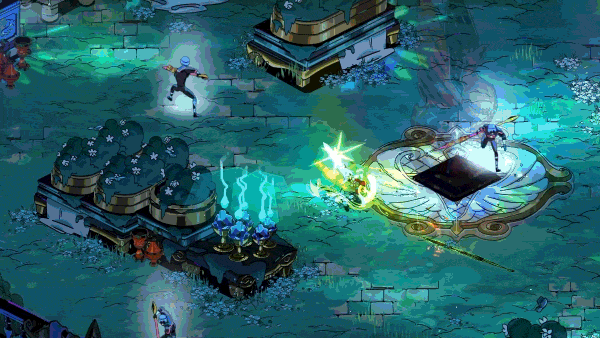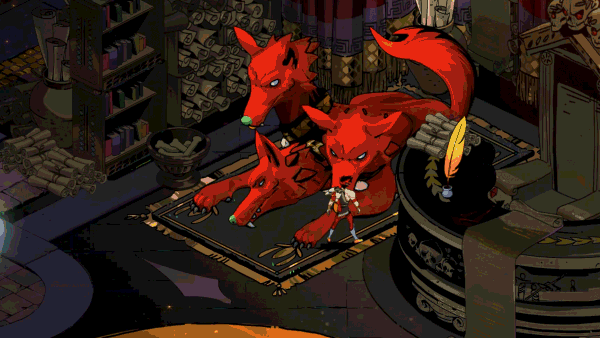It seems like everyone is playing Hades these days. Or perhaps just everyone I know. But admittedly, it’s not hard to see why.
I’m sure you’ve seen some pictures or clips of the art doing the rounds on the internet. Hades is a game that has inspired a great deal of fan art (and a fair amount of thirst), but to be fair, the artwork is striking. It’s an incredible mishmash of dramatic colours and sharp lines which just works. And combined with the amazing soundtrack, incredible voice acting, and oh-so-addicting gameplay… yeah, it’s no wonder this game has made the splash that it has.
Hades is the latest offering from Supergiant Games, the developers behind popular indie games such as Bastion, Transistor, and Pyre. Admittedly, the only game of these that I’d played before was Bastion, and while I found it enjoyable, I wasn’t it’s biggest fan. For how incredible the music, art, and narration were… the combat just felt a little clunky for me.
But with Hades, that’s a different story. The guys over at the Fantasy Inn Discord server have been passively bullying people into picking it up, and honestly I should probably thank them for that. The combat in this game is so smooth, and there’s such a variety to it. There’s a wonderful tactical aspect to the game that ties into the replayability. This is a roguelite (the definition of which is often contentious), which generally means procedurally-generated levels, though with an overarching sense of progression. Meaning that you can carry over certain items from one “run” to the next, or save up on an in-game currency for upgrades that make future runs easier.

Hades perhaps goes overboard on the in-game currency front (there’s something like nine varieties?), but it all makes sense when you figure it out. Each of them allow you to purchase stuff like new weapons, weapon upgrades, character upgrades, lair upgrades, relationship points, and so on. All of which help you to further your goal: to escape from hell.
You play as Zagreus, son of the eponymous lord of the underworld, and someone who has a strained relationship with his daddy and numerous mummy issues. Namely the lack of one. A friendly chthonic god has put you in touch with your estranged family on mount olympus, who grant you “boons” — which manifest as in-game abilities — to help you escape and join them in the aboveworld.

I loved this aspect of the game. There is a shocking variety of boons, and how they interact with each other opens up a tactical sub-layer to the game which makes almost every playthrough seem unique. You could summon bolts of lightning when you dash, deflect enemy attacks with your weapon, curse them with impending doom, or inflict a crippling hangover. As you progress deeper into the game (is it still “deeper” when you’re going in the opposite direction?), these boons stack on top of each other to form ridiculous combinations, making for chaotic battles as the enemies and bosses grow ever-harder. (Fuck you, Theseus!).
The difficulty is pretty brutal at first, before you can upgrade your character, and it remains pretty difficult afterwards. There is functionality to reduce this difficulty though, via a “god mode” accessible from the main menu. This mode slightly reduces the damage you take from enemies, with the percentage of reduction increasing every time you die. I really liked this mechanic, as it goes some way to removing the frustration of almost winning, but dying just before the end. It allows more casual gamers to experience the game without removing the difficulty completely.
But the thing that kept me playing, beyond sheer addictive replayability, was the story. For a game that has so much focus on gameplay and combat, Hades shines when it lets the story take center stage. The voice acting in this game is incredible. Seriously. I cannot emphasize enough how important it was to my enjoyment. The actors bring the characters and their dialogue to life, and suddenly you really, honestly care about a floating head that lives for her job as a maid, or a singer who abandoned his wife in the middle of literal hell. Or your father, who for all his gruff toughness, may have a softer side.
I’m far from an expert on Greek mythology. My biggest brush with it was when my co-blogger, Jenia, introduced me to the Santorini board game. But I really appreciate how Hades portrays the gods of olympus and the underworld as one big, fickle, dysfunctional family. It humanises them. And the resultant emotional investment was always enough to drive me to one. more. playthrough. (Not that I needed much convincing.)
You only need to be successful in 10 or so runs to get the majority of the main story, but the beauty of Hades is that it rewards you for your failures too. Between escape attempts, Zagreus can interact with other characters in the underworld to gather new information, or to forge new relationships. There are so many sub-stories beyond the main overarching story — apparently around 35 hours worth of content. And while the progression of these storylines are glacial — little bits dropped between escape attempts — they did serve to keep me engaged.
Hades is an all-around fantastic game. I paid around £20 for my Switch edition, and beyond some issues on handheld mode when too many elements are on the screen at once, it runs like a dream. The art, gameplay, voice acting, and music are all incredible (seriously, check out Eurydice’s song), and it’s up there with the most addictive games I’ve ever played.
I’d be hard pushed to find anyone I wouldn’t recommend this to. So I’ll just say that if you’re someone who can handle slightly stressful gameplay, and you haven’t already picked Hades up, you should really consider it.
Oh. And most importantly… YOU CAN PET THE DOG!

Hades is available on Desktop and Nintendo Switch.
Buy Hades on: Steam / The Nintendo Store US / UK
